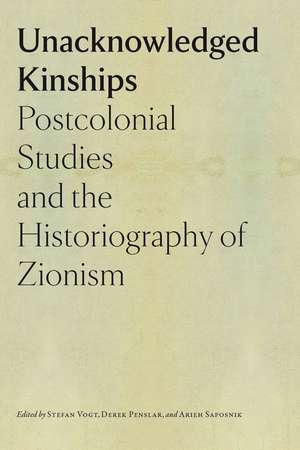Unacknowledged Kinships – Postcolonial Studies and the Historiography of Zionism
Autor Stefan Vogt, Derek Penslar, Arieh Saposniken Limba Engleză Hardback – 13 mar 2024
There is an “unacknowledged kinship” between studies of Zionism and post-colonial studies, a kinship that deserves to be both discovered and acknowledged. Unacknowledged Kinships strives to facilitate a conversation between the historiography of Zionism and postcolonial studies by identifying and exploring possible linkages and affiliations between their subjects as well as the limits of such connections. The contributors to this volume discuss central theoretical concepts developed within the field of postcolonial studies, and they use these concepts to analyze crucial aspects of the history of Zionism while contextualizing Zionist thought, politics, and culture within colonial and postcolonial histories. This book also argues that postcolonial studies could gain from looking at the history of Zionism as an example of not only colonial domination but also the seemingly contradictory processes of national liberation and self-empowerment.
Unacknowledged Kinships is the first work to systematically investigate the potential for a dialogue between postcolonial studies and Zionist historiography. It is also unique in suggesting that postcolonial concepts can be applied to the history of European Zionism just as comprehensively as to the history of Zionism in Palestine and Israel or Arab countries. Most importantly, the book is an overture for a dialogue between postcolonial studies and the historiography of Zionism.
Preț: 573.31 lei
Preț vechi: 736.02 lei
-22% Nou
Puncte Express: 860
Preț estimativ în valută:
109.70€ • 115.15$ • 91.05£
109.70€ • 115.15$ • 91.05£
Carte nepublicată încă
Doresc să fiu notificat când acest titlu va fi disponibil:
Se trimite...
Preluare comenzi: 021 569.72.76
Specificații
ISBN-13: 9781684581559
ISBN-10: 1684581559
Pagini: 360
Ilustrații: 4 halftones, 2 line art
Dimensiuni: 152 x 228 mm
Editura: Brandeis University Press
ISBN-10: 1684581559
Pagini: 360
Ilustrații: 4 halftones, 2 line art
Dimensiuni: 152 x 228 mm
Editura: Brandeis University Press
Notă biografică
Stefan Vogt is Wissenschaftlicher Mitarbeiter and research coordinator at the Martin Buber Chair for Jewish Thought and Philosophy, as well as a Privatdozent for Modern History at the History Department, both at Goethe University in Frankfurt am Main. He is also the editor of the volume Colonialism and the Jews in German History. Derek Penslar is the William Lee Frost Professor of Jewish History at Harvard University. His books include Theodor Herzl: The Charismatic Leader; Israel in History: The Jewish State in Comparative Perspective, The Origins of the State of Israel: A Documentary History (with Eran Kaplan), and Jews and the Military: A History. Penslar is President of the American Academy for Jewish Research, a fellow of the Royal Society of Canada, and an honorary fellow of St. Anne’s College, Oxford. Arieh Saposnik is associate professor at the Ben-Gurion Institute for the Study of Israel and Zionism at Ben-Gurion University in the Negev. He is the author of Becoming Hebrew: The Creation of a Jewish National Culture in Ottoman Palestine and Zionism’s Redemptions: Images of the Past and Visions of the Future in Jewish Nationalism.
Recenzii
“This is a major volume attempting to create a rapprochement between postcolonial studies and the study of Zionism. The volume does what it sets out to do. It is the first serious attempt to rethink this relationship in both theoretical and concrete ways and is an enormously valuable first step in a mutual reassessment of contemporary theoretical approaches to Zionism. Given our present discussions about Zionism and anti-Semitism, a book that is of growing importance each and every day!”
“The history of the Jews and of Zionism have entertained a supremely ambivalent relationship with postcolonial studies. As Europeans’ most distinct and enduring ‘inner’ other, Jews were paradigmatic victims of colonialist practices and ideologies. Yet Zionism itself has often been accused of mirroring European colonialism. This immensely useful book brings much needed order to understand the tangled and ambivalent relationships between postcolonialism and the nationalist history of the Jews. More crucially, it shows that postcolonialism is a needed conceptual framework to further our understanding of the history and sociology of the Jews. This illuminating collection of texts will have a lasting impact on Israel and Jewish Studies.”
“Challenging the received wisdom that defines Zionism as a colonial enterprise, this volume breaks new ground in looking at its many if ultimately unsuccessful links with anticolonial movements worldwide. It represents, in addition, a welcome effort to lend depth and complexity to the history of nationalism more generally.”
“This volume brings together an unusually rich collection of theoretical interventions, historical case studies, and long-deferred conversations that interrogate the fraught relationship between Zionism and postcolonialism. The editors make a strong case for bringing into dialogue the two phenomena and the abundant scholarship they have generated. The result is a deeply engrossing, provocative, and often surprising reading experience that requires one to think anew about core assumptions.”
